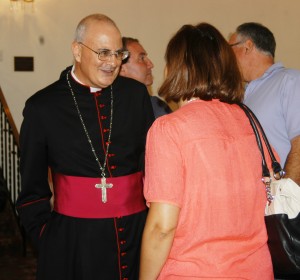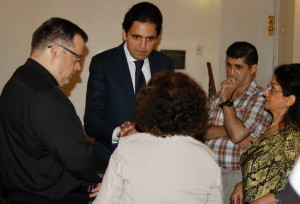As Lebanon welcomes Pope Benedict XVI this weekend, the international community will be watching and listening carefully to the message he brings to the Church in the Middle East.
Sons and daughters of Lebanon, at home and abroad, have been eagerly anticipating Pope Benedict XVI’s visit, the primary purpose of which is to sign and deliver an apostolic exhortation on the special Synod of Bishops for the Middle East, held at the Vatican in October, 2010.
At the closing Mass of the synod, the pope spoke about the need for communion among Catholic churches of different traditions, authentic feedom of religion and conscience, and the urgency and usefulness of dialogue between Christians and Muslims in achieving peace — themes that the pope is likely to address during his visit.

His itinerary includes a stop off at St. Paul’s Basilica, Harissa; meetings with religious, political and cultural leaders; an address to young people outside the Maronite Patriarchate in Bkerke; and the celebration of Mass at the Beirut City Center Waterfront. In the city of Jounieh, residents planned to put white, yellow and red candles on the rooftops of homes and businesses as a sign of welcome.
Last weekend, local Lebanese Catholics offered prayers in anticipation of the pope’s visit during Masses at Our Lady of Lebanon Maronite Cathedral, Brooklyn Heights.
Maronite Bishop Gregory Mansour of the Eparchy of St. Maron, Brooklyn, who served as a delegate at the 2010 synod, was the main celebrant of the 11 a.m. Mass on Sunday, Sept. 9. Concelebrants included retired Bishop Stephen Hector Doueihi and Msgr. James Root, rector.
Celebrating the feast of the Exaltation of the Cross, Bishop Mansour told the faithful, “If we know what is worth living for, we know what is worth dying for.”
While concerns about the Arab Spring and Syrian civil war might have deterred others, he said, “Pope Benedict hasn’t hesitated one minute.”
He explained that the Holy Father is steadfast in his desire to encourage and challenge both Christians and Muslims, and to bring a message of peace and unity.
Parishioner Nicole Safi was sorry she could not return to her native Lebanon to see the pope, but friends and family in Jounieh were keeping her up-to-date on the details of his visit.
She said that Christian clergy and lay people across the country “want to show the world that the Christians in the Middle East, and especially in Lebanon, are united with one another. They are united in their prayers, their solidarity and their love for God.”
Zgharta-born Bishop Doueihi, 85, called the pope’s visit “a great sign” of the Church’s concern for the Lebanese and “for all Christians in the Middle East.”
Fearing de-Christianization in the Middle East, the bishop hopes that the pope’s presence and words will strengthen the faithful of Lebanon and surrounding countries so that his exhortation “does not stay as letters on paper,” he said. “It must go into life.”
Our Lady of Lebanon parishioner Yolla El-Houayek, who is originally from Beydoun, called the pope’s visit “a blessing and an honor for our country. All of the Christians in the Middle East are going to feel much stronger by the pope going there.”
That was also the hope of Majda Georges, who emigrated from Zahle over 15 years ago. She returned home for the first time this summer and was taken aback by the large population of Muslims living near her hometown.
“Christians feel very weak because the majority is Muslim,” she said.
Right now, people have the freedom to say what they want, go where they want and wear what they want, but Georges fears that may change as it has in neighboring countries where Muslim majorities have taken control.
While Christians are no longer the majority in Lebanon, they still “play an important political role in the Middle East,” noted Majdi Ramadan, consul general of Lebanon, who was present at Mass.
Lebanon is home to 18 religious sects, and Christians make up about 40 percent of the population. Additionally, the nation’s president is required to be a Maronite Catholic.

“Everyone in Lebanon is very happy the pope is coming,” said Ramadan, a Muslim, who said he felt at home among his Christian brothers and sisters at the cathedral on Sunday.
“I hope the pope tells Christians to stay in Lebanon and build,” he said. “I hope he tells them to remain active in political and social activities.”
However, Sarya Abi-Habib said she would actually like to see the pope’s visit lead to less politicking and inspire a greater practice of faith, especially among young people like herself.
“Lebanese people here in the U.S., we come to church every Sunday,” said Abi-Habib, who spent three weeks in her native Roumieh this summer.
“In Lebanon, the older people go to church but I see more young people fighting” for various political parties, she said. “Hopefully the pope will bring peace to their hearts and minds.”
“The spirituality of our Church has to be strengthened,” added parishioner Tresa Van Heusen. “I think the pope’s presence will be a great witness.”
